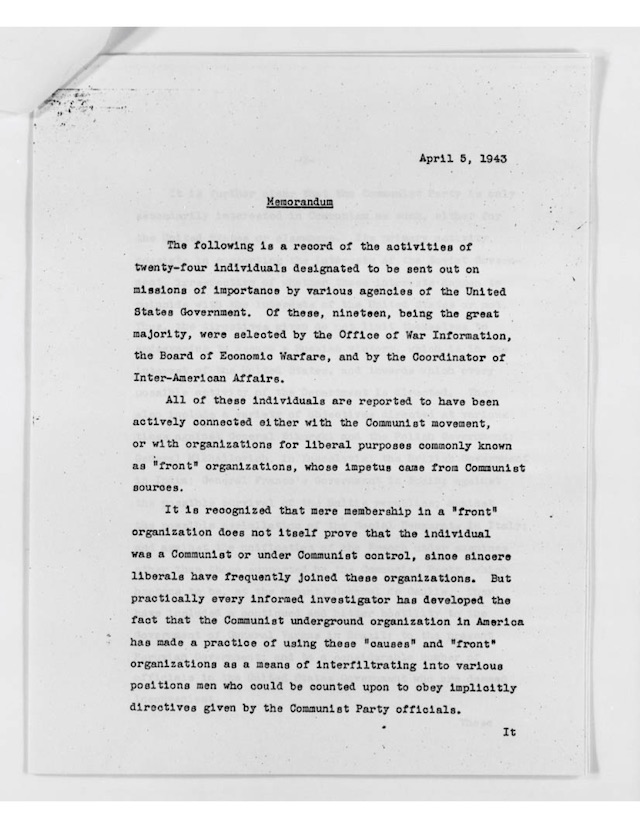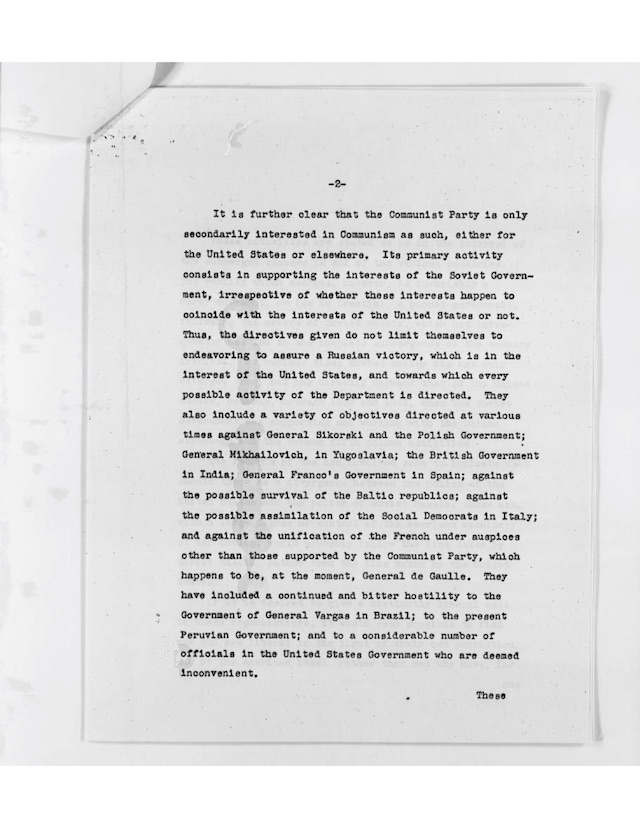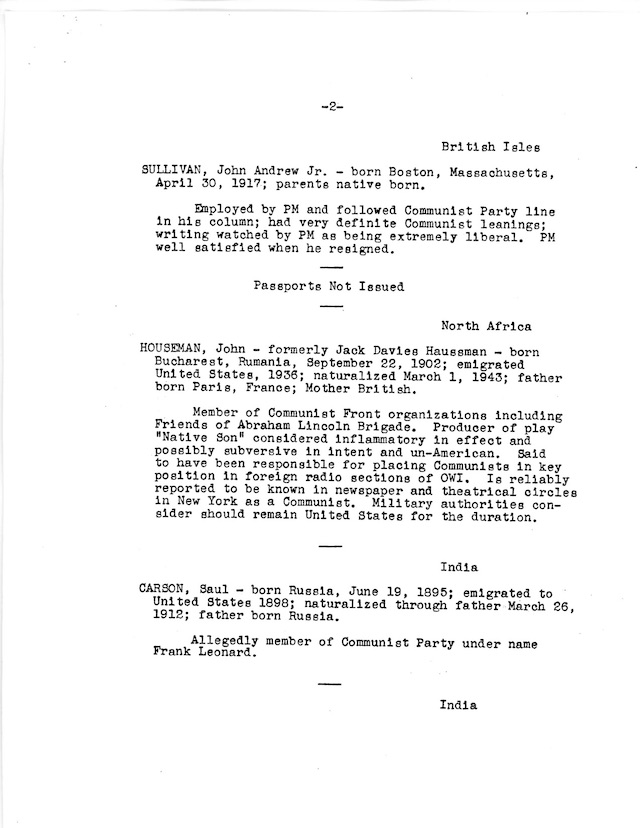Mira Złotowska – Michałowska — among Soviet sympathizers at VOA
By Ted Lipien for Cold War Radio Museum
Soviet influence at Voice of America during World War II — documents and analysis
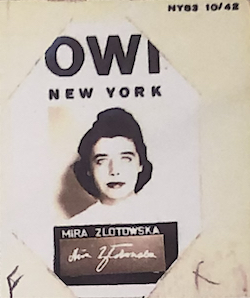
Soviet influence at WWII Voice of America
From VOA to communist regime journalist
Choices of VOA’s pro-Soviet journalist
VOA journalist marries Communists
A pro-Soviet propagandist at OWI and VOA
VOA communist partner Stefan Arski
Pro-Soviet collaborators at OWI and VOA
A VOA friend of Stalin Peace Prize winner
Among Soviet sympathizers at VOA
Critics of her communist influence at VOA
Was she VOA’s communist ‘Mata Hari’?
Mira Złotowska, later known as Mira Michałowska who published books and articles in English as Mira Michal and used several other pen names, was one of many radically left-wing journalists who during World War II worked in New York on Voice of America (VOA) U.S. government anti-Nazi radio broadcasts but also helping to spread Soviet propaganda and censoring news about Stalin’s atrocities. While not the most important among pro-Soviet propagandists at the Voice of America during the war, Michałowska later went back to Poland, married a high-level communist diplomat and for many years supported the regime in Warsaw with soft propaganda in the West while also helping to expose Polish readers to American culture through her magazine articles and translations of American authors. One of the American writers she translated was her former VOA colleague and friend, the 1953 Stalin Peace Prize winner Howard Fast who in 1943 played an important role as VOA’s chief news writer. Despite today’s Russian attempts to undermine journalism with disinformation, the Voice of America has never officially acknowledged its mistakes in allowing pro-Soviet propagandists to take control of its programs for several years during World War II. Eventually, under pressure from congressional and other critics, the Voice of America was reformed in the early 1950s and made a contribution to the fall of communism in East-Central Europe.
Sumner Welles on Houseman and Communists
During World War II, most if not all of foreign language desks producing Voice of America radio broadcasts, at that time still under various names, were dominated by Soviet sympathizers and communists, but the Soviets also had important allies among the very top ranks of the Office of War Information U.S. government agency. Many of the rank-and-file journalists and radio announcers were hired by VOA’s pro-Soviet first director, future Hollywood Oscar-winning actor John Houseman, from among his communist and radically left-leaning friends and associates in the theatre and radio world. He was forced to resign in 1943 when President Roosevelt’s close friend, Under Secretary of State Sumner Welles, warned the White House that Houseman’s support for radical communists made him a security risk.
The memo included a comment on the fascination of some American liberals for Soviet communism and urged finding other liberal individuals—not communist sympathizers—to be put in charge of U.S. government programs.
If it is desired to give a distinctly liberal cast to these organisations, it would seem possible to find men who are liberal in the light of their own conviction, and of the American ideal, rather than men who have, for one reason or another, elected to give expression to their liberalism primarily by joining Communist front organizations, and apparently sacrificing their independence of thought and action to the direction of a distinctly European movement.
The 1943 State Department memo is a timely warning about U.S. government officials and government-employed journalists who for either ideological, partisan or business reasons may be compromised in carrying out their duties. It included one of the best descriptions of how Soviet propaganda and disinformation worked then in an eerily similar fashion to how Russian propaganda and disinformation are employed now against democratic governments and democratic elections.
The records of the men involved seem to indicate that should there be a divergence between the policy of the States and the policy of Soviet Russia, these men, with a large degree of control of the American machinery of war making, would probably follow the line taken by Russia, rather than the line taken by the United States.
The 1943 State Department memo also warned:
It has been the theory of this Department that, outside of Soviet Russia, most of the groups struggling for expression desire freedom and a chance to find their own way, and that they have looked to the United States, rather than to the Russian collectivism, as offering the hope of achieving both social advance and individual freedom. The concern which we have is that the men asked to state, represent and carry out American policy shall be men who both understand that policy, and will be loyal to it, rather than to any outside connection.
The 1943 Sumner Welles’ State Department memo also included a prophetic warning in light of the 2016 Russian propaganda and disinformation campaign targeting American voters to change their views about American politicians disliked by the Kremlin.
They have included a continued and bitter hostility to the Government of General Vargas in Brazil; to the present Peruvian Government; and to a considerable number of officials in the United States Government who are deemed inconvenient.
All of these individuals are reported to have been actively connected either with the Communist movement, or with organisations for liberal purposes commonly known as “front” organizations, whose impetus came from Communist sources.
It is recognized that mere membership in a “front” organisation does not itself prove that the individual was a Communist or under Communist control, since sincere liberals have frequently joined these organizations. But practically every informed investigator has developed the fact that the Communist underground organization in America has made a practice of using these “causes” and “front” organizations as a means of interfiltrating [sic] into various positions men who could be counted upon to obey implicitly directives given by the Communist Party officials.
It is further clear that the Communist Party is only secondarily interested in Communism as such, either for the United States or elsewhere. Its primary activity consists in supporting the interests of the Soviet Government, irrespective of whether these interests happen to coincide with the interests of the United States or not. Thus, the directives given do not limit themselves to endeavoring to assure a Russian victory, which is in the intereet of the United States, and towards which every possible activity of the Department is directed. They also include a variety of objectives directed at various times against General Sikorski and the Polish Government; General Mikhailovich, in Yugoslavia; the British Government in India; General Franco’s Government in Spain; against the possible survival of the Baltic republics; against the possible assimilation of the Social Democrats in Italy; and against the unification of the French under auspices other than those supported by the Communist Party, which happens to be, at the moment, General de Gaulle. They have included a continued and bitter hostility to the Government of General Vargas in Brazil; to the present Peruvian Government; and to a considerable number of officials in the United States Government who are deemed inconvenient.[ref]The memorandum about Soviet and communist influence within the wartime Voice of America, signed off with a cover memo by Under Secretary of State Sumner Welles, a distinguished career diplomat and a major foreign policy advisor to President Roosevelt and his personal friend, was forwarded to the White House with the date, April 6, 1943. The attached memorandum with the addendum listing names of individuals who had been denied U.S. passports for government travel abroad was dated April 5, 1943. The documents were declassified in the mid-1970s and have been accessible online for some time from the Franklin D. Roosevelt Library and Museum Website and the National Archives. It appears, however, that they have never been widely disclosed and analyzed before now. They were presented for the first time with a historical analysis on the Cold War Radio Museum website. Under Secretary of State Sumner Welles April 6, 1943 memorandum to Marvin H. McIntyre, Secretary to the President with enclosures, Franklin D. Roosevelt Library and Museum Website, Box 77, State – Welles, Sumner, 1943-1944; version date 2013. State – Welles, Sumner, 1943-1944, From Collection: FDR-FDRPSF Departmental Correspondence, Series: Departmental Correspondence, 1933 – 1945 Collection: President’s Secretary’s File (Franklin D. Roosevelt Administration), 1933 – 1945, National Archives Identifier: 16619284. https://catalog.archives.gov/id/16619284.[/ref]
Sumner Welles’ memorandum accurately described what Złotowska, Arski and Hoffmeister and many other pro-Soviet journalists were doing at the Voice of America under instructions from John Houseman and OWI’s top leaders: hapless and left-leaning Elmer Davis, left-leaning Robert E. Sherwood, and radically left-leaning Joseph Barnes. In the end, only Barnes was forced to resign. At times, rank-and-file journalists working for Barnes and Houseman went even much beyond what the senior agency leadership wanted them to do. While the Roosevelt administration was already strongly pro-Soviet since Russia became the most important military ally against Germany after the Hitler-Stalin alliance had collapsed, the State Department and the U.S. military, including General Dwight D. Eisenhower, feared that communists and fellow travelers hired by Houseman could put Russia’s interests ahead of America’s national interests. Voice of America’s rank-and-file pro-Soviet journalists were not identified by name in the Sumner Welles’ memorandum. There would have been too many of them to be all listed.
The secret memo focused on John Houseman and his immediate boss and close friend Joseph Barnes. An addendum about John Houseman justifying the State Department’s decision not to allow him to travel abroad on behalf of the U.S. government stated that “Military authorities consider [Houseman] should remain [in the] United States for the duration [of the war].” Without mentioning any names, President Eisenhower accused later some of these OWI and VOA officials and journalists of “insubordination.”[ref]Dwight D. Eisenhower, The White House Years: Waging Peace 1956-1961 (Garden City: Doubleday & Company, 1965) 279.[/ref] When they did cross the line in some of the VOA radio broadcasts, the State Department refused to provide Houseman with a U.S. passport for official travel abroad in order to force his resignation. Leftist journalists like Michałowska, Arski and Hoffmeister and many others were too low within the government ranks to be noticed and continued their work at VOA.
Julius Epstein on VOA’s German Communists
The VOA Polish Service was not unique in pro-Soviet sympathies of most of its editors and writers.VOA hiring practices, although not specifically in reference to Houseman, were noted by one of OWI’s World War II era German-language editors, Austrian-Jewish refugee journalist Julius Epstein who himself had been for a few months a member of the German Communist Party in his student years in Germany, understood communist propaganda and was able to tell who among German and Austrian refugees in the United States were engaging in propaganda activities in support of the Soviet Union.
When I, in 1942, entered the services of what was then the ‘Coordinator of Information’ which became after a few months the O.W.I., I was immediately struck by the fact that the German desk was almost completely seized by extreme left-wingers who indulged in a purely and exaggerated pro-Stalinist propaganda.[ref]Julius Epstein, “The O.W.I. and the Voice of America,” a reprint from the Polish American Journal, Scranton, Pennsylvania, 1952.[/ref]
VOA Director John Houseman
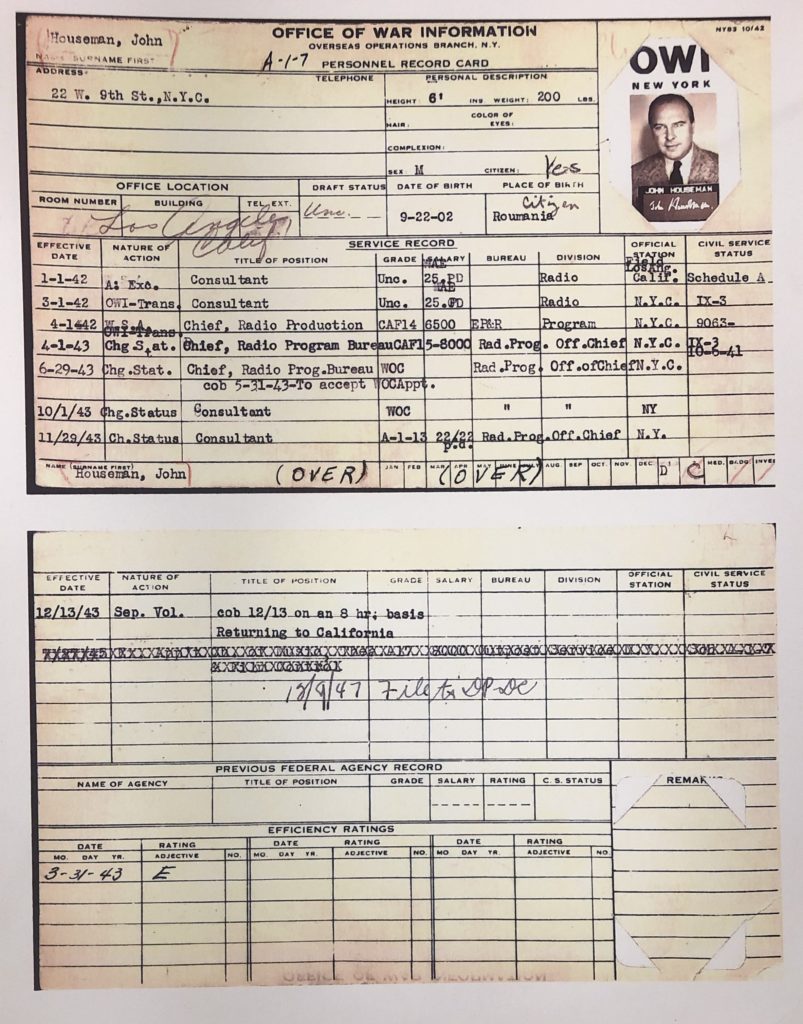
Voice of America’s Katyn and Gulag lies
One of the lies in early Voice of America broadcasts to protect the Soviet Union and Stalin was about the Gulag prison labor camps and its millions of victims, including Polish women and children. If one listened to these VOA radio programs from 1942 to 1945 and even for a few years more, such camps did not exist and no one was fleeing Soviet Russia during the war because they might have been afraid of Stalin and communism. One would not learn from World War II VOA radio broadcasts and OWI propaganda pamphlets about hundreds of thousands of Polish citizens and their entire families living in territories occupied by the Soviet Union under the terms of the Molotov-Ribentropp (Hitler-Stalin) Pact who had been deported on Stalin’s orders to Siberia or to Soviet Central Asia to be used as slave laborers. Many died and many of those who managed to survive never returned to Poland.
A U.S. government World War II document stored at the National Archives in College Park, MD offers a rare glimpse into how the Office of War Information, which was in charge of both domestic and foreign U.S. government propaganda, tried to deceive American and foreign audiences about Polish refugee children from Russia in order to protect Stalin’s reputation and America’s alliance with the Soviet Union. By then, Russia was admittedly the most important U.S. military ally against Nazi Germany, but only after Hitler broke his previous pact with Stalin and attacked the Soviet Union in 1941. The children who came from the eastern part of Poland occupied by the Red Army in 1939 were not victims of Hitler’s Fascism as OWI and VOA broadcasts tried to present them; they were victims of Stalin’s totalitarian Communism. They never saw any Germans occupiers. As the Polish American newspaper Nowy Świat (“New World”) pointed out in January 1944, they were arrested with their parents by the Soviets and sent to the Gulag slave labor camps.
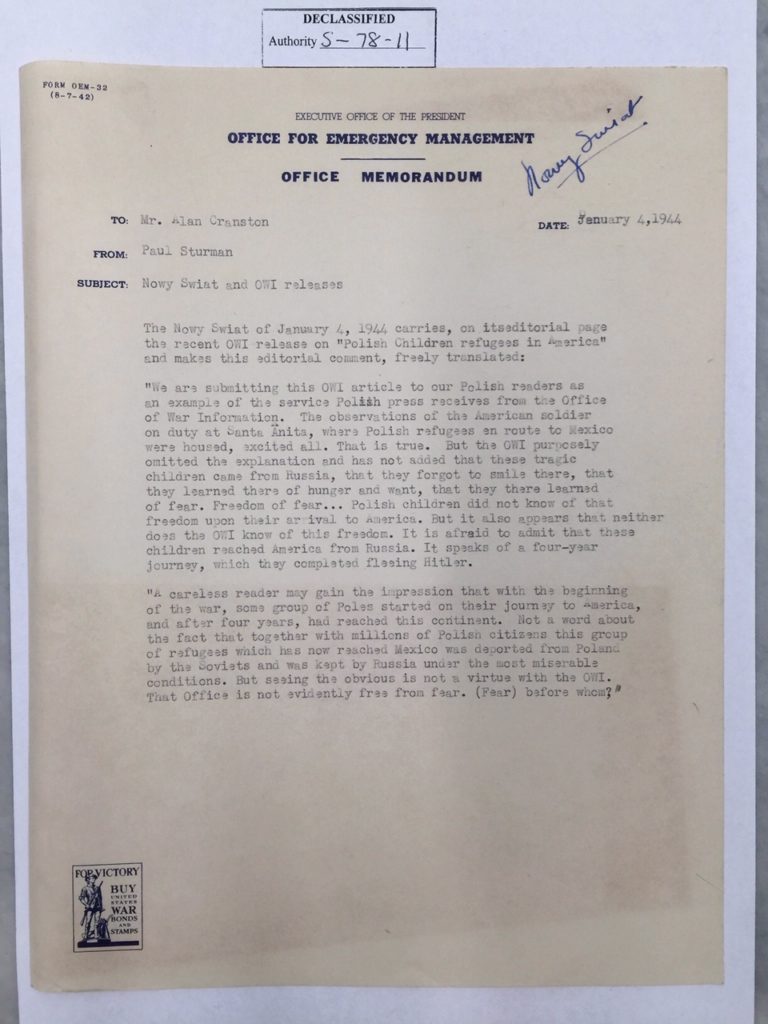
The OWI purposely omitted the explanation and has not added that these tragic children came from Russia, that they forgot to smile there, that they learned there of hunger and want, that they there learned of fear.
A careless reader may gain the impression that with the beginning of the war, some group of Poles started on their journey to America, and after four years, had reached this continent. Not a word about the fact that together with millions of Polish citizens this group of refugees which has now reached Mexico was deported from Poland by the Soviets and was kept by Russia under the most miserable conditions. But seeing the obvious is not a virtue with the OWI. That Office is not evidently free from fear. (Fear) before whom?
In its January 4, 1944 editorial, Nowy Świat, correctly assessed U.S. government’s propaganda and censorship. The government press release included a kernel of truth, but it was otherwise designed to deceive. It is quite possible that at least Arski, if not also Złotowska, were involved in drafting the OWI press release, especially since Arski was already busy denying Stalin’s responsibility for ordering the murder of thousands of Polish military officers.
The first transport of 706 Polish refugees, including 166 children, aboard the USS Hermitage reached the San Pedro naval dock near Los Angeles on June 25, 1943. The women and children under 14 years of age were placed in the Griffith Park Internment Camp in Burbank and the men in the Alien Camp in Tuna Canyon. The second group of 726 Polish refugees including 408 children, mostly orphans (their parents were either worked to death or executed by the Soviets) arrived on the USS Hermitage in the fall of 1943 and was placed in the Santa Anita former detention camp for Japanese Americans. It was the second group that was mentioned in the misleading press release from the Office of War Information. They were later transported to Mexico in sealed train cars under U.S. military guard to prevent them from escaping or having any contacts with ordinary Americans and journalists. None of the Polish refugees in these groups tried to escape. After the war, most of them were allowed to settle in the United States. They could not return to Poland without facing a risk of imprisonment or other forms of persecution, but Złotowska and Arski continued to tell VOA audiences and Americans that there was nothing to fear from the Soviet backed Polish socialists and communists who formed first an interim and later a permanent government in Poland. The permanent government included at first some Polish Peasant Party politicians who soon had to flee from Poland or face arrests and possibly murder.
Part of this history relating to Soviet influence over the wartime Voice of America, its current officials and public affairs specialists do not want Americans to know despite the fact that Russia under Vladimir Putin is once again using similar influence operations to subvert American journalism and media. This is both unfortunate for the sake of historical truth and dangerous for journalism, especially coming from an organization that wants to have an image of engaging in independent news reporting in support of freedom and democracy. Refusal to acknowledge the true history of the organization, both its considerable successes and its initial failures, undermines its current and future effectiveness.
Ted Lipien was Voice of America acting associate director in charge of central news programs before his retirement in 2006. In the 1970s, he worked as a broadcaster in the VOA Polish Service and was the service chief and foreign correspondent in the 1980s during Solidarity’s struggle for democracy in Poland.

